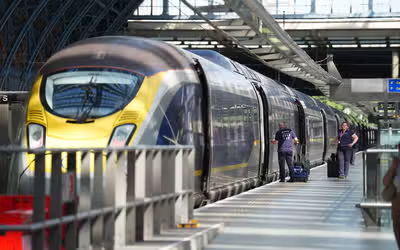
More than two-thirds of Londoners support renationalising the railways, but only as long as they don’t have to pay extra for it, according to a YouGov survey.
The new Labour Government plans to progressively end private rail franchises on each line when the contract ends, and eventually have all train operators back under the control of a new state body.
The survey pointed to strong backing for the policy, which would end decades of fragmentation since the Conservatives privatised the network in the 1990s.
And as Labour grapples with whether to terminate the curtailed HS2 at Euston or Old Oak Common, a majority of 63% also backed connecting major cities via high-speed rail, with 27% opposed.
The pollster YouGov asked 2,084 voters if they thought that railway companies should be nationalised and run in the public sector, or stay run by private companies.
Nationwide, 66% said they should be run by the public sector, against only 12% who preferred continued private control.
Among Conservative voters, a plurality of 48% agreed with nationalisation, while 29% disagreed and 23% said they didn’t know.
In London, the majority was even bigger with 70% backing public control and 12% private - stronger than in the Midlands, the North and the rest of the South of England, and higher also than in Scotland and Wales.
When the respondents were asked about different aspects of rail travel, ticket prices came out as the biggest grievance by far with 77% saying they were bad, compared to 11% who felt they were good.
A total of 84% of Londoners said ticket prices were bad, against 10% who said they were good.
Read More
Overall, majorities in the survey were also unhappy with punctuality/reliability, investment in infrastructure and food and drink under private control.
Respondents were happier with the operators’ record for customer service, frequency of services, availability of seats and the quality of the trains themselves.
But support for rail nationalisation depends strongly on fares and taxes not going up to pay for it, YouGov found.
Six in ten voters (58%) would still support nationalisation as long as ticket prices remained steady. But if taxes were to increase as a result, only 19% would support nationalisation. And if fares were to increase, just 6% back it.
Similar numbers of Londoners were opposed to paying any more in taxes or fares to cover renationalising the railways.
Addressing the Labour conference in Liverpool on Monday, Transport Secretary Louise Haigh vowed to end the “age of privatised chaos”.
She told delegates: “By the end of this Parliament, our railways will be in public ownership, run by Great British Railways in the service of you, the British people.”
But Labour also stands accused by the Conservatives of caving to the unions after train drivers represented by Aslef voted overwhelmingly to accept a pay offer, worth 15 per cent over three years, to end a two-year dispute at 16 rail companies.
In an interview with the Standard last week, Ms Haigh vowed to “tackle the hard yards” on making unions abandon outdated work practices on the railways and to get trains in London running on time.
She said long-suffering commuters could expect to see improvements on train services into the capital from the first half of next year as rail renationalisation starts to have an impact.
Disclaimer: The copyright of this article belongs to the original author. Reposting this article is solely for the purpose of information dissemination and does not constitute any investment advice. If there is any infringement, please contact us immediately. We will make corrections or deletions as necessary. Thank you.



